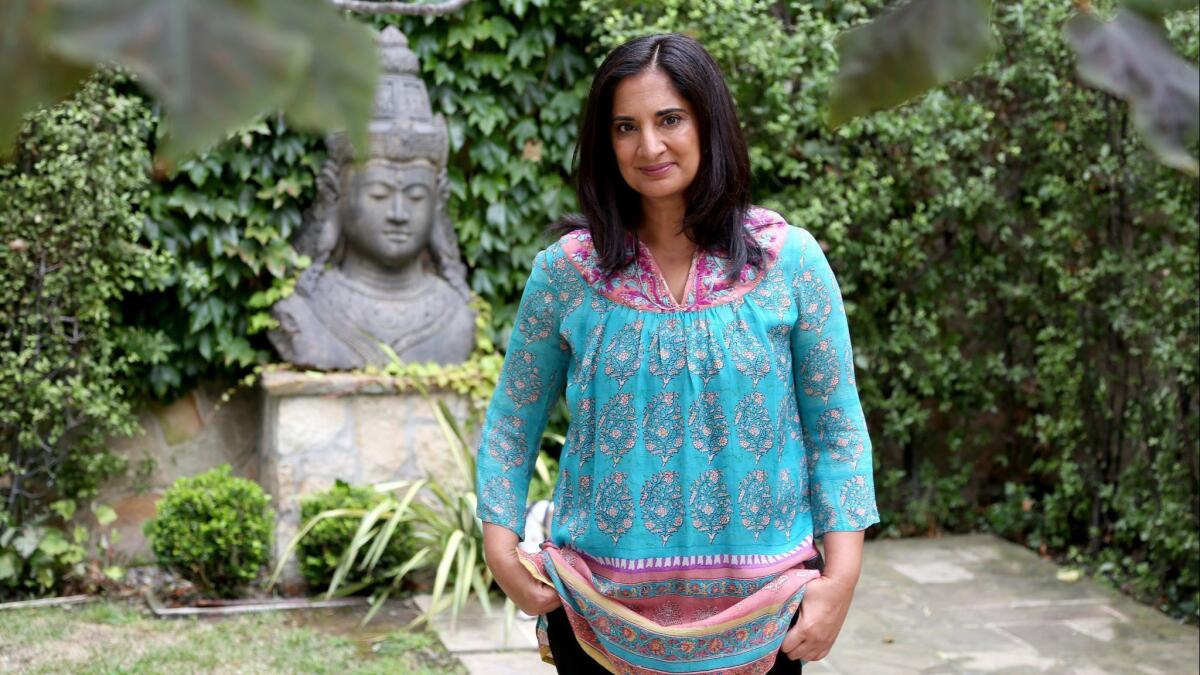Want to improve your meditation practice? Get your kids involved

For Mallika Chopra, childhood was about more than hopscotch and slumber parties. The author and speaker and her filmmaker brother, Gotham, had the unique advantage of being exposed to meditation from the age of 9 thanks to their father — prominent wellness proponent and physician Deepak Chopra.
Close to four decades later, Mallika Chopra, 46, has launched “Just Breathe,” a book specifically about helping kids learn to meditate.
“My parents gifted me meditation when I was young, and it became an anchor for my whole life,” Chopra said on a recent morning, seated at the kitchen table in her Santa Monica home, an aromatherapy diffuser misting on a counter. “When I had my kids, I taught them and then other families in the community. The book allows me to share what I’ve learned with more people — that the regular practice of meditation gives you a connection to yourself which can help you navigate bigger issues.”
Given the number of stresses children these days are exposed to -- competitiveness in academics and athletics, social media, peer pressure, bullying -- Chopra, who has two teenage daughters, believes that the timing is better than ever for a kid-centric book about meditation; it’s written for kids ages 8 to 12 in an easy and nonpreachy style with pretty illustrations. There are fun exercises: In “Bumblebee Breath” she advises kids to cover their ears and breathe out the “buzzing” in an overactive brain.
Thankfully, she says, the book is out when the idea of meditation is mainstream.
“I grew up at a time when all of this was voodoo and crazy,” she said. “Now, it’s trendy. Yoga studios are everywhere. Schools are incorporating meditation and mindfulness, and scientists are talking about it. It’s something that people are intrigued about. But they are still intimidated by the idea of sitting still and emptying their minds. They think, ‘If I can’t do it, how will I ever get my kid to sit still?’”
Chopra’s response: You don’t. Instead, follow her tips below:
1. Yes, you can move
Mindfulness doesn’t have to be sitting still with your eyes closed. You can go for a quiet walk. You can eat mindfully, appreciating the food, the colors, and smells and textures. You can just be conscious of what’s happening around you in the moment, to stop, take three breaths, observe what’s happening with your body, and then proceed.
::
2. Stress happens
My girls might get worked up about a test or a social situation. I wanted to teach them the ability to take a pause, breathe and go from a reactive response to a reflective one. Breathing exercises can help them do that. If there is anxiety around a test, instead of going down that stressful road, children can take some deep breaths and say to themselves, “I’ve got this. I can do this.” And even if they don’t have it, they can just trust that everything will work out.
::
3. Don’t force (or beg or bribe) your kids to meditate
It doesn’t matter if there is resistance. Don’t push them. Maybe the book is just left on your child’s bedside table. Or, as a parent, you suggest going for a family walk or sitting down at dinner and saying something you’re all grateful for today. I once led a third-grade group to meditate, and they were all giggling and rolling their eyes. After half an hour of this, they settled down and we had one minute of silence. A mom said to me afterward, “whether they do this again or not, they will remember this years from now.” That’s the goal. Just introduce it.
::
4. Help kids be better people.
Our physiology is built to react to situations, but in meditation we are given pauses where we can adjust our nervous systems. There are so many big issues for kids today, and I don’t think there is a magic bullet for any of them. But meditation helps you become more empathetic. If you see someone going through something like bullying, you learn to speak up. If you’re going through it, you become secure enough to reach out for help. If you think about times you might have been a bully, this gives you an opportunity for self-reflection.
::
5. Be the role model
Parents teach by example and not words. If you want them to meditate, start the practice yourself. Then introduce a technique that fits your kid and, if it doesn’t work, be flexible and try something else.
::
6. Don’t forget to learn from your kids
Kids are so much more open than adults. They don’t intellectualize everything. They go straight to the experience, giggling and making faces and having fun with it. We can learn as adults to not take life so seriously but to experience things without constantly needing to justify, intellectualize and apologize. Be in the moment of whatever you’re doing.



